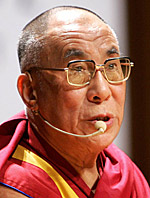




WASHINGTON—Chinese authorities in Tibet have begun a campaign to blacklist key religious figures close to the exiled spiritual leader, the Dalai Lama.
The campaign began Oct. 26 in Tibet’s Chamdo prefecture and focused heavily on the banning of the prominent Oser Lama from returning to his homeland.
Oser, who now lives in southern India, is head of a key Kham monastery of the same name that forms part of the Dalai Lama’s political and religious heartland. He also supervises 22 smaller monasteries in Chamdo prefecture.
“Oser Lama, who is recognized by the Dalai Lama, will not be recognized by the Chinese government,” a source in Markham county told RFA’s Tibetan service. “He is not allowed to come back to Tibet and no one is allowed to have any contact with him.”
The campaign has sparked fears of a renewed attack by Beijing on the Dalai Lama’s following in his homeland.
The Dalai Lama fled Lhasa in 1959 after an unsuccessful revolt against Chinese rule. He leads the Tibetan government-in-exile in Dharamsala, India, but Beijing has ruled him out of Tibet’s future.
Pictures, writings, and video of the Dalai Lama, who is universally revered by Tibetans, are banned in Tibet, and those found in possession of them typically receive prison sentences.
The Dalai Lama has accused the Chinese authorities of carrying out “cultural genocide” in the Himalayan region, and many Tibetans complain of ethnic discrimination following the mass migration of Han Chinese to the region amid growing economic development.
The Markham source said many in the county simply refused to turn up for the campaign against Oser Rinpoche and other lamas recognized by the Dalai Lama.
“All the monks of Oser Monastery in Markham county were called, but no one attended the meeting,” the source said. “When local officials went to check at the monastery they found it completely deserted.”
Oser Lama, currently living in Bylakuppe, India, has a significant following in the county. The prefecture is home to 536 Tibetan Buddhist monasteries, with 52 monasteries in Markham county alone.
Chinese religious affairs officials confirmed the campaign had begun.
“We visited about 100 monasteries close to main road in Kham prefecture and informed them that all those lamas recognized by the Dalai Lama are not recognized by the Chinese government,” Markham County religious affairs bureau chairman Rinchen Phuntsok said in an interview.
“In Markham county, it was announced that Oser Rinpoche is not recognized by the Chinese government and that he is not allowed to return to Tibet,” Rinchen Phuntsok said.
Speaking from Bylakuppe, southern India, Oser Rinpoche said he too had heard the news.
“It is difficult for me to understand,” Oser said. “It was also announced that I would not be allowed to return and that others cannot contact me. The Chinese do not recognize lamas. But the Dalai Lama recognized these lamas according to Buddhist traditions.”
“This very much goes against the official Chinese line, which invites and welcomes all brethren who live abroad to return to Tibet. So it is disappointing and frustrating,” he said.
In its annual International Report on Religious Freedom published Tuesday, the U.S. State Department described the level of religious repression in Tibet as “high.”
“Buddhist leaders such as Gendun Choekyi Nyima and Tenzin Deleg remained in detention or prison, and the most important figures in Tibetan Buddhism such as the Dalai Lama and the Karmapa Lama remained in exile,” the report said.
“Dozens of monks and nuns continued to serve prison terms for their resistance to ‘patriotic education.’“
“The preservation and development of the Tibetan people’s unique religious, cultural, and linguistic heritage and the protection of their fundamental human rights continue to be of concern,” the report said.
It also noted that religious and ethnic minority groups in China, such as Tibetans and Muslim Uyghurs from the northwest, experienced discrimination in society “not only because of their religious beliefs but also because of their status as ethnic minorities with languages and cultures different from the typically wealthier Han Chinese.”
Original reporting in Tibetan (Kham) by Lobsang Choephel. RFA Tibetan service director: Jigme Ngapo. Written in English by Luisetta Mudie and edited by Sarah Jackson-Han.